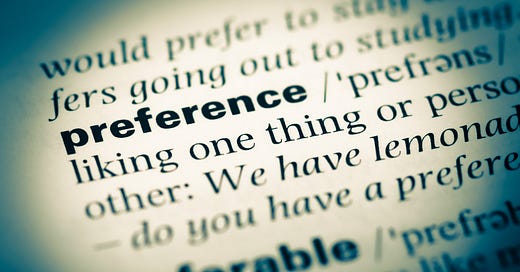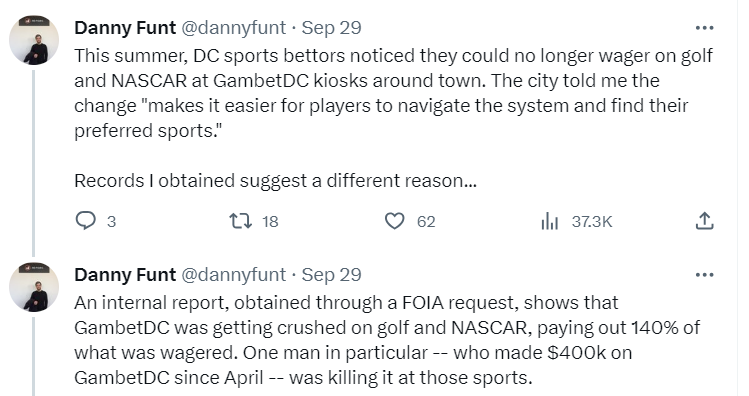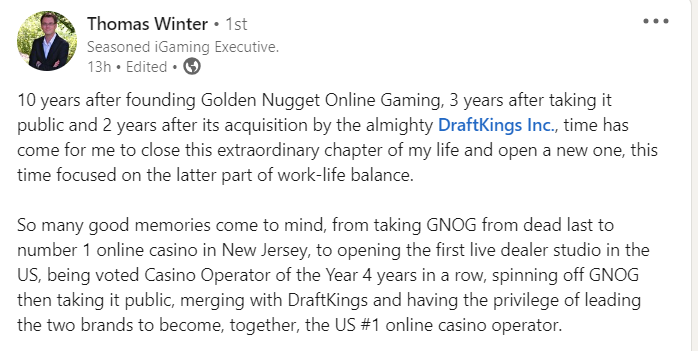Preferential Treatment
Daily fantasy sports is under fire in Florida, but not every operator is receiving the same treatment. That raises the question, is the state playing favorites?
The Bulletin Board
NEWS: The latest on the DFS situation in Florida.
BEYOND the HEADLINE: Why haven’t FanDuel and DraftKings received Cease-and-Desist letters?
NEWS: According to data from GeoComply, Kentucky’s mobile sports betting industry came out of the gate fast.
VIEWS: An unmitigated disaster? DC sports betting lost money in June, and now it wants to limit customers.
QUICK HITTER: Circa is live in Illinois.
AROUND the WATERCOOLER: Refunds and changing of the guard in iGaming.
STRAY THOUGHTS: [Wayne’s World voice] We’re not worthy.
SPONSOR’S MESSAGE - Underdog: the most innovative company in sports gaming.
At Underdog we use our own tech stack to create the industry’s most popular games, designing products specifically for the American sports fan.
Join us as we build the future of sports gaming.
Visit: https://underdogfantasy.com/careers
Florida “Just Says No” to All DFS
The daily fantasy sports industry is under fire in Florida. At least three operates were sent cease-and-desist letters by the Florida Gaming Commission that read in part:
“Under Florida law, betting or wagering on the result of contests of skill, such as sports betting, including fantasy sports betting, is strictly prohibited and constitutes a felony offense unless such activity is otherwise exempted by statute.”
The three companies offer Pick ‘Em style games, but according to the FGC, the game type doesn’t matter; the cease-and-desist letters apply to all paid fantasy sports contests.
From the FGC’s FAQ section:
What about wagering on fantasy sports? Is that allowed?
Again, probably not. Unless you are placing a wager through sportsbooks operated by or in conjunction with the Seminole Tribe of Florida, you are most likely placing an illegal wager.
Need more proof? Underdog (a sponsor of the newsletter) general counsel Nicholas Green queried the commission for clarification:
“As you might imagine, my exec team asking what the letter means and seeking actionable advice, pretty urgently. Would like to discuss the substance at some point, but if you can help with one question, it would be great.
“Namely, Underdog operates multiple paid fantasy formats (season-long drafts, daily drafts, pick’em) and I just want to confirm my reading of the letter, which is that the legal conclusion applies to all paid fantasy contests — e.g., all of our contests — and not just particular types.”
In response to Underdog, Ross Marshman, the general counsel for the FGC, confirmed that Underdog’s reading of the cease-and-desist letter it received was correct, “I can confirm that your reading of the letter is correct.”
All three are still operating, but I would be shocked if that doesn’t change in some way in the not-too-distant future.
I highly recommend reading JohnWallStreet’s take on this topic, and you may as well subscribe while you are there.
Beyond the Headline: A Lingering Question
Last week, I asked who was behind the FGC’s sudden interest in fantasy sports. Now, I have another question, or rather, an observation.
Regardless of how you feel about various DFS products and the cease-and-desist order, there is something that isn’t sitting right: If it applies to all paid fantasy sports contests, why haven’t FanDuel and DraftKings received cease-and-desist letters?
The FGC hasn’t been wishy-washy on this. It applies to all paid fantasy sports contests. Assuming the FGC doesn’t change its mind or reach a compromise position, at some point, DraftKings and FanDuel should expect a letter. That they haven’t already rests somewhere between strange and concerning.
Their influence in Florida is not on the same level as the Seminole Tribe, but in 2021, the companies spent quite a bit of money trying to get sports betting on the 2022 Florida ballot. That effort came up short, but I’m sure the estimated $37 million spent opened doors, made introductions, and is having a lingering impact. After all, having the right friends can certainly buy you some extra time.
Are DraftKings and FanDuel receiving preferential treatment? I don’t know. But if DFS legislation or regulations are introduced in the near future, it would be nice to be the operator who wasn’t asked to stop doing business.
Kentucky Mobile Sports Betting Off to a Good Start
Kentucky’s mobile sports betting launch produced 2 million geolocation checks from 200,000 registered accounts in the first 24 hours, according to data released by GeoComply - follow the link to see GeoComply’s strangely hypnotic pin-drop map.
How does that stack up to other states?
Per GeoComply, the Kentucky numbers are “double the amount of transactions and accounts from Louisiana, a similarly sized state, during this same 24-hour period.”
Reporting on GeoComply data, Play MA relayed that Massachusetts saw “8.1 million geolocation transactions by 406,400 player accounts during the March 10-12 launch weekend.”
Based on the number of accounts comps, Kentucky is clearly outperforming Louisiana but not quite on par with Massachusetts. It’s not a perfect comp, as the Kentucky numbers are over 24 hours and Massachusetts was over 48 hours, but Massachusetts registered twice as many accounts but only has a 35% population edge. Massachusetts also launched just before the NCAA tournament, which certainly helped.
More importantly for the Bluegrass State, its launch has been quite smooth. That was a serious concern given the state’s accelerated launch timeline and inexperienced regulators.
Sponsor’s Message - Jackpocket, America’s #1 lottery app, is proud to partner with Spectrum Gaming Group to release “The Future of Lottery Courier Services,” a report outlining consensus-driven best practices for the industry. Implementing these common-sense measures will help ensure transparency, accountability, and consumer protection, while continuing to sustainably grow the US lottery market without compromising its integrity.
Read the report here: https://blog.jackpocket.com/spectrum-gaming-report-on-the-future-of-lottery-courier-services/
DC Sports Betting Is Fundamentally Broken
How bad is the DC sports betting industry? Worse than we even expected, and expectations were quite low for the lottery-run monopoly.
As reported by the Washington Post, “June was “a very challenging month for all aspects of the business,” according to an internal report prepared by Intralot… That month, Intralot said in the report, marked a dubious first: The sportsbook paid out more in winnings than it collected in wagers.”
The WaPo goes on to note that a single customer was able to put GamBet’s kiosks (there are 70 locations) in the red with $164,000 in winnings by exploiting the company’s odds compared to other operators.
And now the DC Lottery is limiting customers per a new GamBet policy reported by WaPo.
“Emergency action is necessary to promote the immediate preservation of the health, safety, and welfare of District residents,” the Lottery said. “In order to curb excessive wagering and ensure responsible play at retail locations.”
The result, some markets were removed entirely.
And as Chris Grove recently tweeted:
David VanEgmond, a former executive at FanDuel and Barstool Sportsbook, told the WaPo that it’s not strange for books to have a losing day or weekend, but it’s “very rare” for an operator to lose money over an entire month. “A whole month indicates poor risk management and operations,” VanEgmond said.
“Gambet is a disaster,” Former DC council member Elissa Silverman told Sports Handle. “I am not a fan of sports gambling, but if we are going to do it, it should generate revenue for important things like schools, public safety, and housing. The Council needs to scrap Gambet and move to a market-based system.”
All of this is occurring in the aftermath of DC cutting the already wholly inadequate $200,000 of funding for problem gambling.
Disaster indeed.
Quick Hitter: Circa Launches in Illinois
Circa Sports went live in Illinois last week, marking the well-known bookmaker’s fourth state launch: Nevada, Colorado, Iowa, and Illinois.
Circa prides itself on being a bettor’s bookmaker and has a similar strategy as Prime Sports (which I covered fairly recently).
Around the Watercooler
Social media conversations, rumors, and gossip.
Here we go again with the refunds after the “slide heard around the world.” Tweets from David Purdum, Jeremy Balan, and Circa’s Jeffrey Benson.
There is something happening in the world of online gambling. The old guard is exiting. Last week, it was GAN’s Dermot Smurfit, and this week, it’s Golden Nugget Online Gaming’s Thomas Winter, who announced his semi-retirement on LinkedIn.
It’s hard to put into perspective what Winter accomplished at GNOG (his memories above are far too modest), but as I commented on his post, Golden Nugget “changed the perception of online gambling in the US, and blew the lid off what everyone thought was possible.”
If you’re part of this industry post-PASPA, these names may not mean much, but Smurfit and Winter were game-changers.
Stray Thoughts
One of the questions I’ve been asking is how do I choose what to cover? The simple answer is I cover the things that interest me or pique my curiosity.
I also gravitate toward topics where I can add some value to the conversation. It’s not that the stories that don’t make the newsletter aren’t interesting or “worthy.” Rather, most of the time, they are covered 10 times over by other outlets, and I have little to add to the discourse.
That’s why there is far more coverage of new entrants rather than established brands. And a smattering of post-launch results coverage but lots of updates on the lead-up.
And then there are the random topics I follow, ranging from poker to legal issues to RG discussions to Atlantic City to online lotteries and everything in between. That’s what makes this newsletter different and interesting (IMO).











